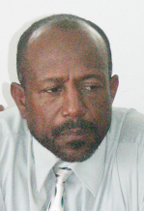The realisation of a 10-year dream of the Guyana Football Federation (GFF) is just around the corner as its president Colin Klass disclosed yesterday that phase one of the FIFA Goal Project is expected to be completed within a three-to-five-month span.

The goal project will include a national technical centre with a playing field, stands, dressing rooms and accommodation and will enable the GFF to offer adequate training conditions to its national teams at all levels.
Alki Investment Inc. would be responsible for the construction of the US$400,000 facility located at Orangestein, East Bank Essequibo and Klass speaking with Stabroek Sport yesterday said, “Well actually, they received their 10% of the money today (yesterday).”
“The consulting architect is the person who is supposed to overlook the project,” Klass noted. The architectural consultant is Rowel Jordon of Rowel Jordon Associates.
Guyana have had the FIFA goal project in the pipeline for a number of years and numerous factors over that period have been preventing the commencement of the project.
At the last FIFA Congress in The Bahamas, Austin Jack Warner, vice president of the sport’s governing body, had expressed his displeasure, stating that “Guyana was one of the first countries where we had initiated this programme.” He had added, “One would have thought by now Guyana would have been on their third goal programme as many other countries have been and therefore there is some disappointment.”
In 1999, Guyana, Belize, The Bahamas, Nicaragua and St Lucia were listed as countries to benefit from FIFA’s new initiative, the ‘Goal Project’.
The year 2001 saw FIFA president Joseph Sepp Blatter visiting Guyana reportedly for the momentous turning of the sod for what was thought to be this country’s first football stadium on land under the control of the University of Guyana.
But Blatter had stated that the building of stadiums was the responsibility of governments and subsequently revealed that FIFA would contribute some US$400,000 once the GFF is able to acquire the necessary land.
The local football federation struggled for years to acquire a piece of land from the Government of Guyana until Moroccan Alami Binani made available to them a piece of land at Orangestein, East Bank Essequibo.
“The whole stalling is a procedural thing, matter of fact I wouldn’t consider it a stall because the process that FIFA uses is a very detailed process and I must say they do a lot of fine tuning of everything, so they check to ensure that the documentation sent is in compliance with the FIFA regulation for such projects, in addition to that, they also ensure that each member association gets total value for their money so it would go through all the legal processes,” Klass said.
The GFF president further stated: “So it’s a whole long process and being that it is our first Goal Project, they scrutinized everything because the architectural contract was already signed. It’s two separate contracts we have, the architectural consultant contract and you have the contractor’s contract. Because of the length of time we took to realise our first project and the escalation of cost over these years, it means that the amount of work we would have gotten back then, now we’ll have less work, so you’ll have a lot of foundation work being done and the field might be completed.”
Klass pointed out that the FIFA Goal Project has a minimum of three phases, where “this first phase FIFA has allocated US$400,000 and once this is completed and the managers in FIFA are satisfied, we would go on to phase two. But what we are hoping is that immediately after phase one, phase two starts.
“Things like stands and dormitory and so on would not be completed in phase one, which is primarily the field and foundation for these things,” Klass said, adding that they have to construct a road to the Essequibo facility because of its distance from the public road and that is very costly.




